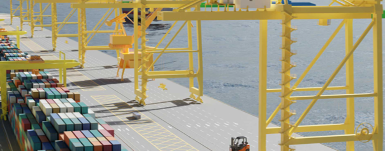
Carnot specializes in high-efficiency engine technology designed to reduce emissions and improve energy efficiency across heavy industries. Their engines utilize advanced materials and innovative design to achieve significantly higher efficiency than conventional systems.
By being fuel-agnostic, they can operate on hydrogen, ammonia, methanol, and other low-carbon fuels, making them adaptable for various applications. Carnot’s technology aims to decarbonize sectors like maritime, heavy-duty transport, and off-grid power, supporting global sustainability goals.

Key Features of Carnot Engines
- High Efficiency – Carnot’s engines achieve 68–72% efficiency, significantly surpassing traditional combustion engines (25–35%), reducing fuel consumption and emissions.
- Fuel Flexibility – These engines are designed to operate on multiple decarbonized fuels, including hydrogen, ammonia, methanol, biogas, and HVO, ensuring adaptability across industries.
- Reduced Carbon Emissions – By optimizing thermodynamic efficiency and using low-carbon fuels, Carnot helps industries cut CO2 emissions and progress toward Net Zero goals.
- Versatile Applications – Their technology supports various sectors, including maritime, heavy-duty transport, and off-grid power, providing sustainable energy solutions.
- Advanced Materials & Design – Built with cutting-edge materials and innovative engineering, Carnot’s engines deliver superior durability, efficiency, and performance.

Team

Archie Watts-Farmer
CEO & Co-Founder

Francis Lempp
Co-Founder

Nadiur Rahman
Co-Founder
Mandate
Engineering and ClimateTech
VC/Equity
Problems Carnot Aims to Solve
- Low Engine Efficiency – Traditional combustion engines operate at only 25–35% efficiency, leading to high fuel consumption and wasted energy. Carnot’s engines achieve 68–72% efficiency, maximizing energy use.
- High Carbon Emissions – Fossil-fuel-powered engines contribute significantly to global CO2 emissions. Carnot’s fuel-flexible technology enables the use of hydrogen, ammonia, and other low-carbon fuels to support decarbonization.
- Dependence on Fossil Fuels – Many industries, including maritime and heavy-duty transport, rely heavily on fossil fuels. Carnot’s engines offer an alternative that can operate on sustainable fuels, reducing reliance on oil and gas.
- Energy Costs & Fuel Consumption – Inefficient engines lead to higher fuel costs and operational expenses. By improving efficiency, Carnot helps industries lower energy costs and improve economic sustainability.
- Hard-to-Decarbonize Sectors – Sectors like shipping, off-grid power, and heavy industry face challenges in reducing emissions. Carnot’s technology provides a viable solution for these sectors to transition toward Net Zero.

Competitive Advantages of Carnot
- Ultra-High Efficiency
Carnot’s engines reach 68–72% efficiency, far exceeding traditional internal combustion engines. This means more energy output from the same amount of fuel, reducing waste and cost. - Fuel Flexibility
The engines are compatible with multiple low-carbon and renewable fuels, including hydrogen, ammonia, methanol, biogas, and HVO—supporting a smooth transition to sustainable energy sources. - Lower Emissions
By combining high efficiency with clean fuels, Carnot significantly cuts CO₂ emissions, helping industries meet climate goals and regulatory standards. - Support for Hard-to-Decarbonize Sectors
Carnot provides a practical solution for sectors like maritime, heavy-duty transport, and off-grid power, where electrification is difficult or inefficient. - Economic Benefits
Improved efficiency and reduced fuel use lower operating costs. Additionally, sustainable practices and emissions reductions attract investors and open up new funding opportunities. - Circular Economy-Aligned Design
Carnot’s technology is built with sustainable materials and long-term usability in mind, supporting a circular economy by minimizing waste and maximizing resource lifespan.



Invest
- *Needs registration
- *Needs registration
GENERAL ADVICE WARNING: Being general advice, these Investment Opportunities do not take into account your objectives, financial situation, or needs. Before acting on any of these referrals you should therefore consider the appropriateness of this referral having regard to your situation. We recommend you obtain financial, legal, and taxation advice before making any financial investment decision. You should obtain, read, and understand all the relevant product disclosure statements or offer documents before investing in any financial product. Rodller is not a financial advisor. We disclose public information and the final decision as well as due diligence is between the investor and the investee.
Rodller Pte Ltd and each of their respective directors, officers, and agents believe that the information contained in this message and its attachments have been obtained from reliable sources and that any estimates, opinions, or conclusions, are reasonably held at the time of compilation. No warranty is made as to the accuracy of the information on this website and, to the maximum extent permitted by law, Rodller Pte Ltd disclaims all liability for any loss or damage which may be suffered by any transaction through relying on anything contained or omitted from this website.
Singapore Office
Center Singapore HQ
Rodller Pte. Ltd160 Robinson Road,
14-04, Singapore
068914
UEN 202125442C
Rodller Pte. Ltd160 Robinson Road,
14-04, Singapore
068914
UEN 202125442C
Copyright | All Rights Reserved Rodller 2025

